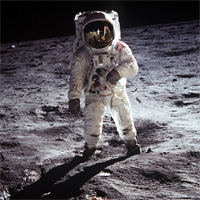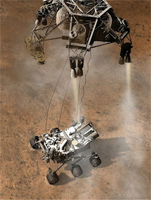 Mars One is a project to start colonizing Mars funded by a reality TV show of the volunteers who go. It looks quite serious, and they seem to have a reasonable technical plan for getting four astronauts to the surface of Mars with enough supplies and equipment to survive for an indefinite period going forward. The plan would be for more volunteers to arrive at the rate of four every two years, but this is to add to the population, not to rotate them back out.
Mars One is a project to start colonizing Mars funded by a reality TV show of the volunteers who go. It looks quite serious, and they seem to have a reasonable technical plan for getting four astronauts to the surface of Mars with enough supplies and equipment to survive for an indefinite period going forward. The plan would be for more volunteers to arrive at the rate of four every two years, but this is to add to the population, not to rotate them back out.
The front-loaded price tag looks to be in the neighborhood of $6 billion USD, which they are trying to raise privately. Part of me wants to vent in frustration that if only NASA and the US Congress had the balls to step and fund something like this, it would be a done deal, but that’s a rant for another time. Perhaps the biggest challenge Mars One faces is not the technical problems but the financial one of raising that much money before much of any television revenue materializes. I wish them luck.
 Mostly, though, I want to talk about death, because that’s where these guys are headed. They make no bones about it, but this is a one-way ticket. I don’t think that they’re going to perish en route or in their first week, but the very real fact is that these volunteers are going to die on Mars. There is no return-flight on the horizon. This is nothing all that new in human history. There have been plenty of cases where colonists sailed off to the wilderness, fully intent on never returning, but in today’s world of jet travel, we’ve gotten away from that thinking.
Mostly, though, I want to talk about death, because that’s where these guys are headed. They make no bones about it, but this is a one-way ticket. I don’t think that they’re going to perish en route or in their first week, but the very real fact is that these volunteers are going to die on Mars. There is no return-flight on the horizon. This is nothing all that new in human history. There have been plenty of cases where colonists sailed off to the wilderness, fully intent on never returning, but in today’s world of jet travel, we’ve gotten away from that thinking.
But how soon will they die? Hopefully, they will a long time there, but conditions will be harsh, and simple activities will be fairly dangerous. I think there is a better than 50-50 chance that all four colonists would make it through the first two years. At that point, the next batch of colonists will arrive, and more construction will ensue for the next batch to arrive another two years into the future. However, if one of them dies before that second batch arrives, I worry that the project will falter. I’m sure they worry as well, and they seem to be doing everything they can to make those first two years as safe as possible with redundant systems.
Still, in the long run, there may be health problems associated with low gravity. Also, between the trip and years spent under Mars’ thin atmosphere, radiation will increase the risk of cancer. Furthermore, the limited food supply may cause other health issues. It seems reasonable to think that a colonist’s remaining life expectancy on Mars might be half of that on Earth. A fifty-year-old who thought he had another thirty years left to him might only get fifteen. A twenty-year-old hoping to last until eighty might be dead at fifty. But then, a seventy-year-old might only be trading away five years of life-expectancy.
So, is it worth it? Obviously that’s a question for each individual, and for the 80,000 or so who have already signed up, the answer appears to be yes. I suspect the selection criteria is going to aim for healthy people in their thirties to fifties. They have good life experience, and at that age, it seems less likely that their decision to go would be based on a youthful whim. Add another eight years of training, and we’re talking about sending people in their forties to sixties. They might only be trading away ten to twenty years.
For some, it would be worth it just to have the experience of living on Mars. I confess that if my life had gone another direction and left me without my wife, children, and other close friends, it would be seriously tempting. I’m a lifelong SF geek, and the idea of waking up every morning on another planet is serious wish-fulfillment territory. I might trade a decade of life for such an experience.
 For others, there might be a little lure for fame. Certainly with the reality TV show funding the ongoing operations, there will be a lot of fame back on Earth, but there is also the compelling allure of a place in the history books. They will be up there with Columbus and Neil Armstrong in the history books. Martian high schools will someday be named after them. Historians will perpetually debate the critical airlock decision of 2027. For some people, that is essentially their immortality, and an early death on the mortal plane is worth it.
For others, there might be a little lure for fame. Certainly with the reality TV show funding the ongoing operations, there will be a lot of fame back on Earth, but there is also the compelling allure of a place in the history books. They will be up there with Columbus and Neil Armstrong in the history books. Martian high schools will someday be named after them. Historians will perpetually debate the critical airlock decision of 2027. For some people, that is essentially their immortality, and an early death on the mortal plane is worth it.
But for some special few, I think they will want to do simply to push humanity into the heavens. They won’t care about Earth-side opinions. They won’t care if their name is spelled right in the history books. They’ll care that we got out there and someday, went even further. Hopefully, they’ll die decades from now when people are planning the tentative robotic exploration of some Earthlike exoplanets orbiting other stars. They will slip gently into the night, comforted by the knowledge that humanity won’t.
If I had my pick, these are the ones I would send up first.



 In my lifetime, Mars has gone from being a light in the sky to being a place. As corny as it sounds, it has become the new frontier, that faraway land across the sea, and I feel a definite itch to go see it. What things could I see that no one has seen before? What could I build there? Who else would I meet on such an exciting journey? What mark would I leave on such a world?
In my lifetime, Mars has gone from being a light in the sky to being a place. As corny as it sounds, it has become the new frontier, that faraway land across the sea, and I feel a definite itch to go see it. What things could I see that no one has seen before? What could I build there? Who else would I meet on such an exciting journey? What mark would I leave on such a world?
 The space race, from Mercury through Apollo, made science cool. It wasn’t all white-coats, beakers, and blackboards. It was fiery rockets going to fantastic places. It was making maps and looking over the horizon. Fill up that extra oxygen tank, Sparky, because we’re heading out in the morning!
The space race, from Mercury through Apollo, made science cool. It wasn’t all white-coats, beakers, and blackboards. It was fiery rockets going to fantastic places. It was making maps and looking over the horizon. Fill up that extra oxygen tank, Sparky, because we’re heading out in the morning!
 Yet I haven’t heard a single proposal about inspiration. No one is talking about lighting that fire to make kids want to explore science in the first place. That’s not a decision we make when graduating high school. It’s not even a decision we make when we’re going into high school. I think that decision is made somewhere deep inside when we’re seven or eight years old. It lights a fuse inside, and it keeps us going until we’re blowing up chemistry labs and crashing mom’s computer.
Yet I haven’t heard a single proposal about inspiration. No one is talking about lighting that fire to make kids want to explore science in the first place. That’s not a decision we make when graduating high school. It’s not even a decision we make when we’re going into high school. I think that decision is made somewhere deep inside when we’re seven or eight years old. It lights a fuse inside, and it keeps us going until we’re blowing up chemistry labs and crashing mom’s computer.